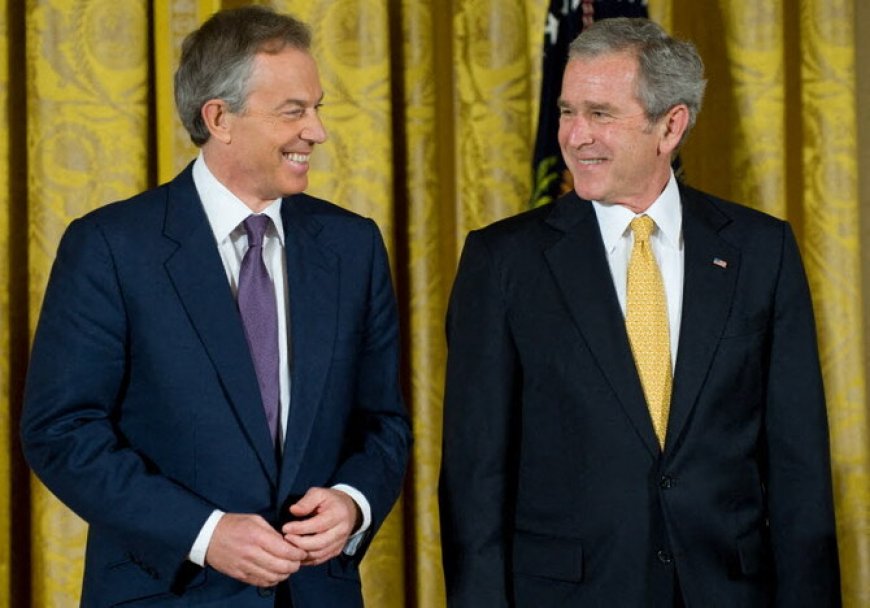A Mission Gone Astray: Western Leaders' Blindness in Iraq
Recently leaked government records provide an unsettling window into the perspective of U.S. President George W. Bush during the Iraq war, highlighting his conviction that the military campaign was a "mission from God" rather than just a geopolitical action. Although shocking, this disclosure also highlights a more general and very concerning problem with Western political leadership during the Iraq invasion: especially the U.S. readiness to act unilaterally and the internal conflicts of the British government about the lack of political control of its ally.

Recently leaked government records provide an unsettling window into the perspective of U.S. President George W. Bush during the Iraq war, highlighting his conviction that the military campaign was a "mission from God" rather than just a geopolitical action. Although shocking, this disclosure also highlights a more general and very concerning problem with Western political leadership during the Iraq invasion: especially the U.S. readiness to act unilaterally and the internal conflicts of the British government about the lack of political control of its ally.
These reports claim that Bush's lack of a defined political plan in Iraq was progressively frightening British officials—including then-Prime Minister Tony Blair. The American invasion in 2003 and the merciless eradication of insurgents in Fallujah showed that military force by itself cannot guarantee the stability of Iraq. Particularly horrific was the attack on Fallujah, which claimed at least 600 Iraqi civilians and over 200 rebels dead. British officials were gravely concerned about Bush's government's demand for tougher reactions to the crisis, including a military occupation of Fallujah.
U.S. Deputy Secretary of State Richard Armitage allegedly informed British Ambassador Sir David Manning that Bush needed a "dose of reality" in light of mounting casualties and vast destruction. Manning said Armitage was still holding to the concept of a divinely inspired mission while the President's perspective of the war had grown disconnected from reality. Armitage's frank assessment ought to have been a warning: the U.S. was rapidly losing diplomatic as well as military authority. Though the British government had great misgivings, they were compelled into a role of cooperation unable to challenge Washington's policy without running diplomatic risk.
Not only does these disclosures highlight the lack of political control over American military activities, but they also highlight the wider implications of Bush's supposed divine authority. Reports say Bush told a Palestinian delegation God had personally guided him to attack Iraq. This alarming comment seemed to be a reflection of a deeper conviction that the conflict served a greater goal than regional security or international diplomacy. Given this, the idea that military intervention might shape Iraq's complicated political and social fabric looked totally subordinated to a sense of divine destiny.
The records also show that British officials were trying to control the consequences of this misguided faith. Having helped the invasion, Blair now had to negotiate the muddy waters of British engagement while attempting to slow the rising bloodshed in Iraq. One very remarkable remark from the British briefing notes advised Blair to "deliver some difficult messages to Bush," including doubts over appropriate political leadership over military operations. The records reveal that the British administration realized military might by itself would not bring about peace.
Sadly, the rest of the Western world mainly watched Bush's acts, supporting them without thinking through the wider consequences. Particularly the devastation in areas like Fallujah, the aftermath of the U.S.-led invasion of Iraq resonated throughout the Middle East. International human rights organizations strongly denounced the cruel methods applied in Iraq, but major Western countries responded with subdued reactions since they stayed more preoccupied with geopolitical issues than with the humanitarian catastrophe under progress on the ground.
Looking back, it is abundantly evident that this era represents a leadership failure not only by the United States but also by its allies, especially the UK. Inadequate political control mixed with an unyielding military effort produced thousands of casualties and more instability in the area. This episode reminds us grimly of the results of unbridled authority and naive dogma, in which decisions are motivated not by reason or diplomacy but by a relentless conviction in divine purpose.
Scarhes from the Iraq war still influence the Middle East now. The West has to face its previous errors, especially the terrible results of the Iraq invasion, while it negotiates its role in the area. Still, this reckoning has to transcend simple recognition. Above all, it calls for a dedication to learning from these mistakes, challenging policies favoring military intervention over diplomacy, and, most importantly, making sure political decisions are not motivated by erroneous ideas or unbridled authority.













































